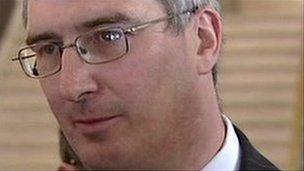Tom Elliott's bumpy ride since taking over UUP leadership
- Published

Tom Elliott slipped on a number of banana skins, most of his own making
It was always going to be a tough job.
When Tom Elliott became Ulster Unionist leader in 2010, he took charge of a party which had been losing ground for more than a decade against its old enemy the DUP.
The Ulster Unionists had hoped a political alliance with David Cameron's Conservatives would help restore their fortunes.
Instead it cost the party its only MP.
The election of an Orangeman and former Ulster Defence Regiment soldier as leader represented a return to unionist tradition.
Mr Elliott might not have been charismatic, but his supporters hoped he would steady the ship.
Instead he slipped on a number of banana skins, most of his own making.
His pledge not to attend gay pride parades or Gaelic football matches pushed liberal unionists like former Irish rugby international Trevor Ringland out of the party.
A conference speech in which the new leader proclaimed he was "no dinosaur" only emphasised his difficulties in adapting to changing realities.
An angry scene at an election count, at which Mr Elliott branded flag-waving Sinn Fein supporters as "scum", came over badly on live TV.
The Ulster Unionist leader won some support for defying Orange Order rules to attend the Catholic funeral of a young police officer murdered by republican dissidents.
In person he came across as a courteous soft-spoken countryman, but his charm did not transmit well over the airwaves.
Argument
Beyond personality, however, is the problem of how to deal with the ever more dominant DUP.
Mr Elliott authorised secret talks with his party's rivals, but then fell out with his colleague David McNarry, claiming Mr McNarry had revealed too much of the negotiations to the newspapers.
This row seems to have brought matters to a head.
Behind it lies the wider question of whether the Ulster Unionists should continue to share a place in government with the DUP, or whether their best strategy for survival is to put some clear orange water between themselves and the DUP by going into opposition.
The Regional Development Minister, Danny Kennedy, seems comfortable with governing as part of a wider unionist group.
Recently he appeared alongside DUP and Sinn Fein ministers to announce the upgrading of Northern Ireland's A5 road - a project his own leader had been consistently sceptical about.
Others such as the deputy leader John McAllister and the former leadership contender Basil McCrea seem much more drawn towards opposition.
Expect some of those politicians to be in the fray for the UUP leadership.
Another contender could be the former TV presenter Mike Nesbitt.
With the previous alliance with the Conservatives consigned to history, and the potential for future boundary changes further eating into the Ulster Unionists' numbers, the task facing Mr Elliott's successor will be even more difficult than the one the Fermanagh MLA took on in 2010.
- Published9 March 2012
- Published6 March 2012
- Published30 January 2012
- Published27 January 2012
- Published11 May 2011